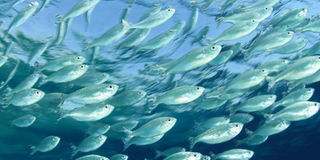Boost fisheries sector to up economy, health

What you need to know:
Tanzania, for instance, has an abundance of fish in its waters, yet, as researches show, our people eat on average 8kg of fish per year, which is less than half the international average of 17kg. Given that fish is more efficient in providing nutrients than other sources of animal protein, there should be more push for its production and consumption.
A country’s economic wellbeing is not just the abundance of resources; it is also, and mainly, about the capacity of the people to harness what is available for their advantage.
Tanzania, for instance, has an abundance of fish in its waters, yet, as researches show, our people eat on average 8kg of fish per year, which is less than half the international average of 17kg. Given that fish is more efficient in providing nutrients than other sources of animal protein, there should be more push for its production and consumption.
Surveys show that a third of our children aged under five are deficient in in iron and vitamin A, which leads to stunting, while a third of women aged between 15 and 49 are deficient in iron, vitamin A and iodine. Improved consumption of fish can greatly change this.
The country is blessed with many water bodies including rivers, lakes and a huge share of the Indian Ocean. Which is to say, the potential for having more fish for people’s dietary needs as well as economic wellbeing of our fishermen is very high.
There is therefore a need to push for improved modes of fishing in order to boost our fishermen’s catches.
Tanzania is reputed to have around half of the world’s tilapia species, yet more than 90 per cent of commercial production of this protein source is in China!
It means, our failure to reap ample benefits from fish is not borne out of lack of this resource; it is, rather, a consequence of our failure to exploit our abundant stocks of fish Tanzanian waters. By encouraging modern fishing methods at sea, rivers and at lakes, as well as fish rearing, the fisheries sub-sector can easily raise its contribution to the national gross domestic product (GDP), which currently stands at 4.5 per cent.
IMPROVE EXTENSION SERVICES
Agriculture is Tanzania’s economic mainstay, contributing 25 per cent of its gross domestic product and employs nearly 70 per cent of the country’s workforce.
Which is to say, it is agriculture that drives the Tanzania’s economy. Various efforts have been initiated to develop the sector. One of the main methods has been the use of extension officers.
However, the country continues to face numerous challenges in the provision of extension services.
The Controller and Auditor General (CAG) points out in his 2015 report on the performance of provision of extension services that one officer serves two to three villages.
He also says that the extension officers are mostly poorly trained and equipped. The report further shows that there is always a delay in the disbursement of funds to extension officers from the relevant offices. This year, the country is facing famine due to lack of rainfall. Now, had the country utilised well the services of extension officers, the situation could have been different. Why, such officers would have educated the farmers on the importance of planting drought-resistant crops.
The government must therefore increase the number of extension officers, provide them with the required equipment and sufficient funds and training.
At the same time, it must provide them with means of transport, housing and guidance on best farming practices.




